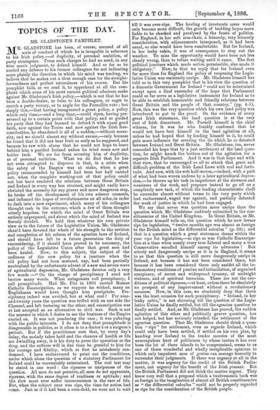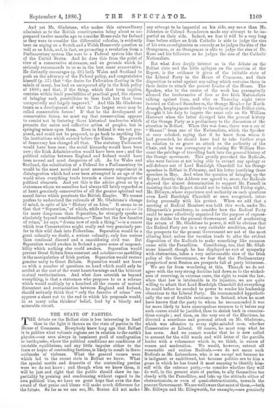TOPICS OF THE DAY.
MR. GLADSTONE'S PAMPRTFIT till it was over-ripe. The healing of inveterate sores would only become more difficult, the growth of budding hopes more liable to be checked and paralysed by the frosts of politics. For England, in her soft arm-chair, a leisurely, very leisurely consideration, with adjournments interposed, as it had been usual, so also would have been comfortable. But for Ireland, in her leaky cabin, it was of consequence to stop out the weather. To miss the opportunity would have been not less clearly wrong, than to refuse waiting until it came. The first political juncture which made action permissible, also made it obligatory." Now, to that we reply that for Ireland even far more than for England the policy of reopening the Legis- lative Union was eminently unripe. Mr. Gladstone himself has told us in this very pamphlet that in his view the question of a domestic Government for Ireland "could not be entertained except upon a final surrender of the hope that Parliament could so far serve as a legislative instrument for Ireland as to be able to establish honourable and friendly relations between Great Britain and the people of that country." (pp. 4-5). Now, this was the very question which his own land policy was introduced to put to the proof. On the evidence of every great Irish statesman, the land question is at the very root of Irish discontent. Mr. Parnell himself is the chief witness, for it was he who frankly confessed that he would not have lent himself to the land agitation at all, unless he had hoped that by lending himself to it, he could gain more influence for severing the tie which he so detested. between Ireland and Great Britain. Mr. Gladstone, too, never concealed his hope that by a just settlement of the land ques- tion, he might knock the bottom out of the agitation for a separate Irish Parliament. And it was in that hope and with that view, that he encouraged us all to attack that great and difficult problem of the Irish Land Laws with zeal and forti- tude. And now, with the web half-woven,—indeed, with a part of what had been woven undone by a later agricultural depres- sion,—he throws up his task in impatience at the slowness and weariness of the work, and proposes instead to go off on a completely new tack, of which the leading characteristic shall be surrender almost without terms to the very party which had embarrassed, waged war against, and partially defeated the work of justice in which he had been engaged.
We say that never was question more unripe than the question which Mr. Gladstone suddenly submitted to the con- stituencies of the United Kingdom. In Great Britain, as Mr. Gladstone himself tells us, the question which he now deems ripe for legislation, "twelve months ago was almost as foreign, to the British mind as the differential calculus" (p. 38); and that is a question which a great statesman deems within the year ripe for legislation,—as ripe as was Catholic Emancipa- tion at a time when nearly every true Liberal and many a true Conservative enrolled himself among its advocates ! But utterly and dangerously unripe as it is in England, it seems to us that this question is still more dangerously unripe in Ireland, not because it has not been considered there, but because it has been considered there only amidst all the in- flammatory conditions of passion and intimidation, of organised conspiracy, of secret and widespread tyranny, of midnight violence, and of spiritual terrorism. These are not the con- ditions of political ripeness,—at least, unless there be absolutely no prospect of any improvement without a revolutionary measure. Now, in this case, we absolutely deny that there was the least occasion for such precipitancy. "Ireland, in her leaky cabin," is not shivering till the question of the Legis- lative Union be finally settled, but till the agrarian question be finally settled. And, as Mr. Gladstone has proved, the sudden agitation of this other and politically graver question, has not helped, but has seriously retarded, the settlement of the agrarian question. That Mr. Gladstone should think a ques- tion "ripe" for settlement, even as regards Ireland, which could only have been settled, if settled on his own plan, by handing over Ireland to the tender mercies of the most unscrupulous knot of politicians by whose tactics it has ever been the lot of these islands to be compromised, seems to us one of those wonderful and wholly inexplicable opinions to which only impatient men of genius can manage honestly to surrender their judgments. If there was urgency at all in the matter, it was urgency for the credit of the British Parlia- ment, not urgency for the benefit of the Irish peasant. But the British Parliament did not think the matter urgent. They knew very well that a proposal which a twelvemonth back was as foreign to the imagination of almost all British constituencies as "the differential calculus" could not be properly regarded as ripe for the consideration of the British people. And yet Mr. Gladstone, who makes this extraordinary admission as to the British constituencies being about as un- prepared twelve months ago to consider Home-rule for Ireland as they were to consider the differential calculus, is evidently bent on urging on a Scotch and a Welsh Home-rule question as well as an Irish, and, in fact, on promoting a revolution from a Parliamentary system like ours to a Federal system like that of the United States. And he does this from the point of view of a conservative statesman, and on grounds which he seriously recommends to us as in the best sense conservative. He distinctly encourages (p. 36) both Wales and Scotland to push on the advocacy of the Federal policy, and congratulates himself (p. 37) that "the desire for Federation floating in the minds of many, has had an unexpected ally in the Irish policy of 1886; and that, if the thing, which that term implies, contains within itself possibilities of practical good, the chance of bringing such possibilities to bear fruit has thus been unexpectedly and largely improved." And this Mr. Gladstone treats as a development of what in the largest sense may be called conservative forces ! If that be the development of conservative forces, we must say that conservatism appears to consist not in fostering those historical tendencies which promote the union and collective action of peoples, but in springing mines upon them. Even in Ireland it was not pro- posed, and could not be proposed, to go back to anything like the institutions which existed before the Union. The growth of democracy has changed all that. The statutory Parliament would have been new; the social hierarchy would have been new ; the Irish Administration would have been new ; and the political relation between England and Ireland would have been newest and most dangerous of all. As for Wales and Scotland, the substitution of a Federal for a Parliamentary tie would be the most novel and most unnecessary experiment in disintegration which had ever been attempted in an age of the world when everything tends towards a closer integration of political elements. And yet this is the advice given us by a statesman whom we ourselves had always till lately regarded as at heart genuinely conservative of all the greater spiritual and moral forces which penetrate the British Empire. We cannot profess to understand the rationale of Mr. Gladstone's change of mind, in spite of his History of an Idea." It seems to us that that "Separations" of which, while advocating a via me ?la far more dangerous than Separation, he strangely speaks as absolutely beyond consideration,—" None but the few fanatics of crime," Ire says," dream now of such a thing,"--is a course which true Conservatives might really and very genuinely pre- fer to this wild dash into Federalism. Separation would be a great calamity no doubt, a serious calamity, only less serious than continual discord and a smouldering civil war. But Separation would awaken in Ireland a grave sense of responsi- bility which nothing else could awaken. Separation would prevent Great Britain from constant and mischievous meddling in the manipulation of Irish parties. Separation would restore genuine unity to Great Britain. Separation would not leave us with a number of questions on hand which could only be settled at the cost of the worst heart-burnings and the bitterest mutual recriminations. And what does astonish us beyond everything, is that a statesman who proposes to us a scheme which would multiply by a hundred all the causes of mutual discontent and recrimination between England and Ireland, should seriously think that " only the fanatics of crime" can approve a short cut to the end to which his proposals would, in so many calm thinkers' belief, lead by a bloody and miserable circuit.



































 Previous page
Previous page